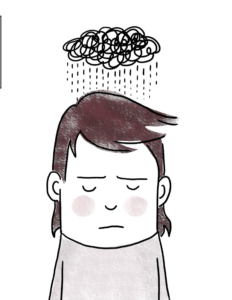 We often hear that we have to be able to ‘let go’: let go of the past, a difficult situation, a break-up, a failure. You may have noticed, as I have, that despite the relevance of this advice, it’s not so easy to apply.
We often hear that we have to be able to ‘let go’: let go of the past, a difficult situation, a break-up, a failure. You may have noticed, as I have, that despite the relevance of this advice, it’s not so easy to apply.
Thinking and talking to my clients about it , I’ve noticed that we often refer to ‘letting go’ as a synonym for not feeling what’s disturbing and unpleasant about situations we’d like to leave behind. Because it’s unpleasant, we try not to feel it. But by not feeling it, we can’t let it go.
When we accept that a situation has been important in our lives without pretending indifference or detachment, its end leads us to experience sensations such as a sense of loss, a feeling of failure, a loss of control, regardless of whether or not it corresponds to reality. Then, let it go can be difficult.
The difficulty of feeling unpleasant sensations and the reaction to protect ourselves against them so that we can continue to function in everyday life are perfectly natural. But our resistance to these experiences highlights our desire for reality, our reality, to be different, less frustrating, less difficult, less disappointing.
And through this resistance, we maintain in the present what has already happened in the past.
This leads me to think that perhaps a better concept for training our attention to let go would be ‘surrender’: accepting that the ‘battle’ has been lost and that we can therefore stop trying to change/control/modify reality. It’s a question of training ourselves to accept what is. Surrendering to what is by feeling what has happened and its consequences.
To achieve this result, our training will be to :
- Allowing ourselves to connect with the unpleasant emotions linked to the situation that we would like to leave behind us.
- Acknowledging our feelings while trying not to judge, recriminate or blame ourselves or others. Here, the difficulty lies in getting our mind to observe what has happened and the emotions it arouses, without intervening or trying to explain or justify.
- Encouraging circulation and, above all, digestion during this process means returning to conscious breathing: this allows us to feel more, to integrate what has happened and finally to let it go.
Personally, I find the practice of mobilising my mind towards those aspects of the experience that allow me to learn about myself – how I responded in such a situation/relationship, but also about others a particularly useful tool.
Surrendering thus becomes an important step in the process of digestion, integration and composting to create new humus for new flowers to grow.
As always, I’d be delighted to support you in your process of letting go.
 In the book ‘The Myth of Normality’ by Gabor Maté, this fantastic author describes the deleterious effects of stressors on our health. He mentions as main stressors – beside the tragic consequences of big but also small traumas – uncertainty, conflicts, lack of control, lack of information.
In the book ‘The Myth of Normality’ by Gabor Maté, this fantastic author describes the deleterious effects of stressors on our health. He mentions as main stressors – beside the tragic consequences of big but also small traumas – uncertainty, conflicts, lack of control, lack of information.

